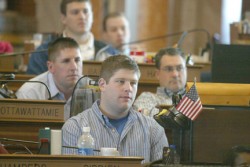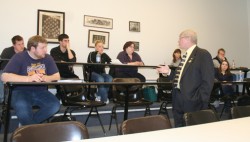 Students sit at legislators’ desks in the House Chambers. |
Approximately 140 first-year students in Drake University Law School visited the State Capitol in January for an introduction to the legislative process as part of Drake’s year-long orientation program for the first-year class.
The students were welcomed in the House Chambers by several Drake faculty members, including former Republican Majority Leader Lawrence Pope, now professor of law and director of Drake’s Center for Legislative Practice.
Reps. Scott Raecker, R-Urbandale, and Geri Huser, D-Altoona, discussed the role of legislators in society. House Majority Leader Kevin McCarthy spoke on the goals of the 2007 General Assembly, and Rep. Jo Oldson, D-Des Moines, addressed the students about her work as chair of the House Appropriations Committee.
Students also met with Drake Law School alumni who discussed their careers in the legislative arena and conducted walking tours of the Capitol and legislative facilities for small groups of students. The students then reassembled in the House Chambers for a discussion of 2007 legislative proposals.
The orientation was designed to help students understand the role and power of legislation as a source of law and its relation to the role of courts in interpreting law. In addition, the students were introduced to legislation as a career opportunity both in the political sense and as a profession in bill drafting, lobbying and related roles.
“We recognize that government relations and legislative practice are increasingly a part of what lawyers do,” said David Walker, dean of the Law School. “Our orientation introduces students to the legislative branch in a way that I know of no other law school doing.”
 Michael Josephson visited Drake Law School in January to discuss the importance of ethics and values in the legal profession. |
Law School expands innovative ethics program
Contrary to popular wisdom, it is possible to be a good lawyer and a good person. That’s the message that ethics expert Michael Josephson brought to Drake Law School in January when he met with the entire first-year class to discuss the vital importance of ethics and values in the legal profession.
Josephson, a former attorney and law professor who founded the Josephson Institute of Ethics, also joined four Drake faculty members in co-teaching seminars for small groups of first-year students that explored ethical dilemmas they may face in law school and later in practice.
Drake is the only law school in the country that utilizes the values expressed in Josephson’s CHARACTER COUNTS! program, a system of teaching ethics employed at schools and workplaces nationwide. This approach has also been adopted by the U.S. Olympic Committee, the U.S. Naval Academy and several major corporations.
The Law School has expanded its orientation for first-year students into a yearlong program that emphasizes ethics and professionalism. The Drake initiative preceded the release of the Carnegie Foundation for the Advancement of Teaching’s recent report on legal education, which calls for a “solid ethical grounding” for students in their first year of law school.
The report, “Educating Lawyers: Preparation for the Profession of Law,” states that “In their all-consuming first year, students are told to set aside their desire for justice. They are warned not to let their moral concerns or compassion for the people in the cases they discuss cloud their legal analyses. . . . Students often find this confusing and disillusioning. The fact that moral concerns are reintroduced only haphazardly conveys a cynical impression of the law that is rarely intended.”
To remedy this, the report recommends that “The dramatic results of the first year of law school’s emphasis on well-honed skills of legal analysis should be matched by similarly strong skill in serving clients and a solid ethical grounding.” The Drake Law School, with its historical balance of theory and practice, has long embraced the educational philosophy advocated by the Carnegie Report, and the Law School’s new ethics programming again puts Drake on the cutting edge of legal education.
Students and faculty gave Josephson high marks on his visit. “I liked how [he] challenged the students and gave many of them the idea that there is another way. I just hope it takes root,” one student said in his evaluation of the program.
“The impact of the Josephson Institute on education, business and legislative initiatives is remarkable,” said Melissa Weresh, professor of law and one of the faculty members who taught a seminar with Josephson. “His message to law students was that one should aspire to be, first and foremost, a good person. Once that objective is clear, one can then focus on being a good lawyer. The two are not mutually exclusive.”
Second-degree murder case takes center stage in cutting-edge trial practicum experience
First-year Drake Law School students observed a trial in February that convicted a Mitchellville man with second-degree murder. The proceedings took place in the Drake Legal Clinic courtroom in the Neal and Bea Smith Law Center.
Drake students witnessed the trial from jury selection to jury verdict — including special briefings with the attorneys trying the case on both sides, exclusive conversations with the judge and debriefings with jury members following the conclusion of the trial.
In the State of Iowa v. Bobby Joe Stouffer, Stouffer was originally charged with involuntary manslaughter in May 2006 in the death of Mitchellville resident Shannon “Shane” Batty. The autopsy determined Batty died as a result of a single gunshot wound to the abdomen. On Oct. 16, 2006, the charges against Stouffer were amended to second-degree murder.
Iowa District Court Judge Joel D. Novak presided over the case. Assistant Polk County attorneys Nan Horvat, LW’81, and Jaki Livingston, LW’93, were the prosecutors. Jason Dunn, LW’04, and Pamela Summers from the Public Defender’s Office represented the defendant.
“The Trial Practicum is cutting-edge education,” said Russell Lovell, Drake Law School associate dean and professor of law. “Drake is the only law school in the country that cancels classes for a week so its first-year students can observe a jury trial from beginning to end. The Trial Practicum is the laboratory that makes the first-year classroom, the book learning, come alive.”
Coordinated by Lovell, this Trial Practicum observation experience gives students the unique opportunity to see a trial inside and out in a way they can’t get at any other law school in the country. It’s an element of Drake Law School’s curriculum that he believes should be considered for inclusion in curriculum reforms nationwide. His article, titled “Trial Practicum Integral to First-Year Law School Curriculum,” was published in the American Judicature Society’s November/December 2006 issue of Judicature.
Twenty-two lawyers, judges and members of the law faculty volunteered a week of their time, observed the case and met with students in small groups to discuss the testimony, the judge’s rulings and the lawyers’ strategies — all to give the future barristers a preview of their coming career.
The students rotated between watching the trial live in Drake’s Smith Center courtroom and observing it on closed-circuit television from several conference rooms throughout the Smith Law Center. Discussion of the events in the courtroom, with special focus on jury selection, evidence, litigation practice, professionalism and procedure — as well as the law involved in the case — occurred, including on-the-spot commentary in the conference rooms.
“It is surprising to most non-lawyers to learn that very few law school graduates have ever observed a complete trial — civil or criminal — at any point in their education,” Lovell says. “Our students consistently tell us their observation of a jury trial in the Trial Practicum is a highlight of their first year, if not their entire law school experience, and that it goes a long way to making them better lawyers in the future.”
Iowa Supreme Court holds special session at Drake Law School
First-year students at Drake University Law School heard oral arguments before the Iowa Supreme Court March 7 in the Drake Legal Clinic courtroom in the Neal and Bea Smith Law Center.
Following the arguments, the justices participated in a question-and-answer session for the students. This special event is designed to help law students become more familiar with appellate court procedure and arguments. Live streaming video of the proceedings are available on the Drake Law School Web site at law.drake.edu. This is the first time that there has been live streaming video of an Iowa Supreme Court hearing.
The court heard arguments in two cases:
Tobie Anderson, Plaintiff-Appellant, v. Nextel Partners Inc., Defendant-Appellee
On appeal from an adverse summary judgment ruling, the plaintiff argues the district court erroneously concluded her contract for cellular phone service was not subject to the Iowa Consumer Credit Code. She contends the contract was a consumer credit sale subject to the Code and the Code’s prohibition on default charges and early termination fees is not preempted by the Federal Communications Act.
Ames Rental Property Association, Plaintiff-Appellant, v. City of Ames, Defendant-Appellee
Ames Rental Property Association (ARPA) appeals from a grant of summary judgment in favor of the city of Ames. It argues the district court erred in determining a city zoning ordinance that prohibits more than three unrelated people from living with each other in certain areas zoned as a “single family district” was constitutional. ARPA argues the zoning ordinance violates the equal protection clauses of the state and federal constitutions.
The hearing at Drake is part of the Law School’s 70th Annual Supreme Court Celebration, which also included a breakfast before the hearing for students and justices of the Iowa Supreme Court. The justices had lunch with Drake Law School faculty that day. In addition, Iowa Supreme Court Justice Mark Cady, LA’75, LW’78, and Iowa Supreme Court Scholar Jess Phelps previewed the article they have co-authored and took questions from justices and faculty.
As part of the Supreme Court Celebration, Justice Cady also visited a class March 9 to talk with first-year students about professionalism and ethics in the practice of law.

